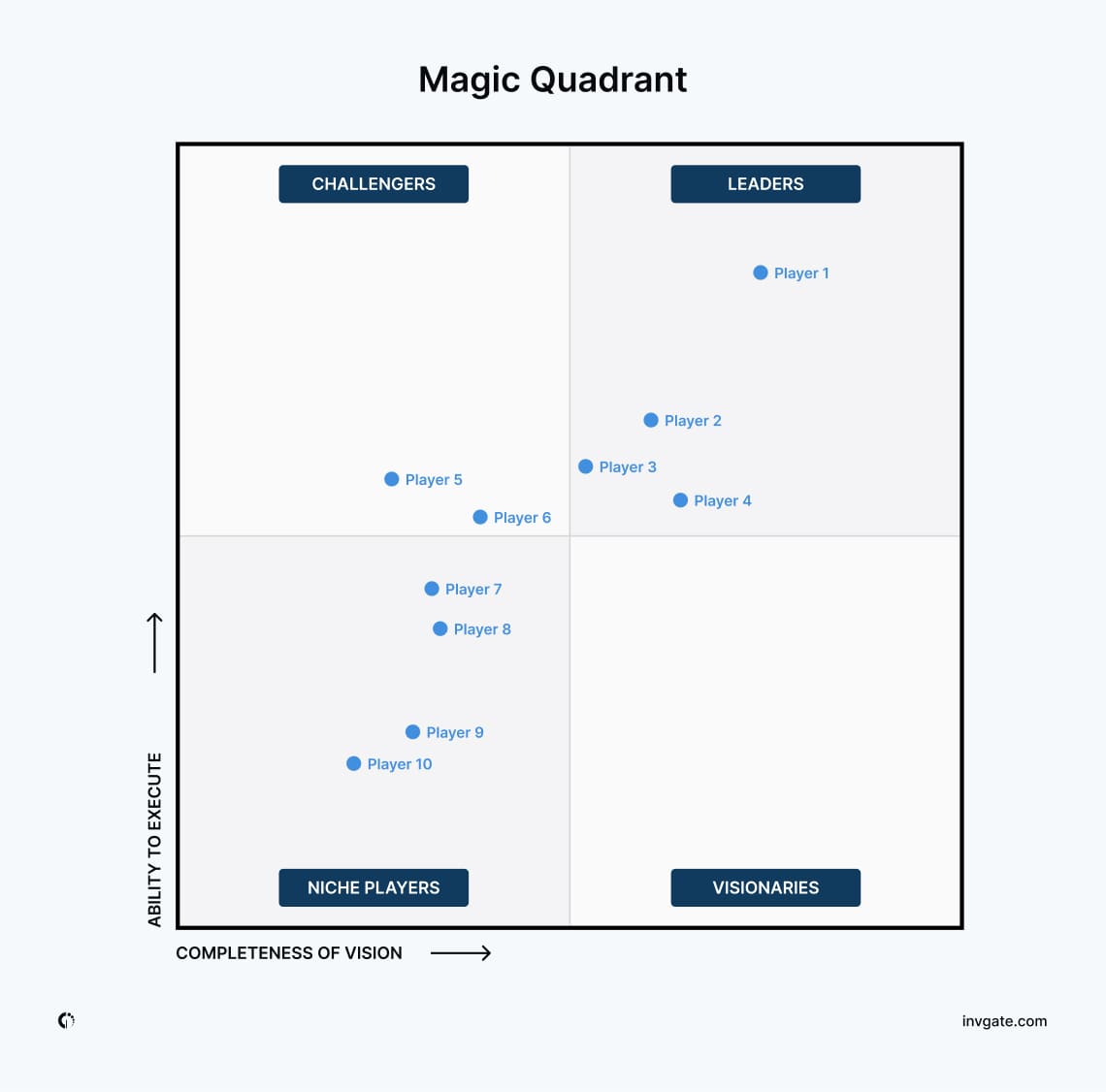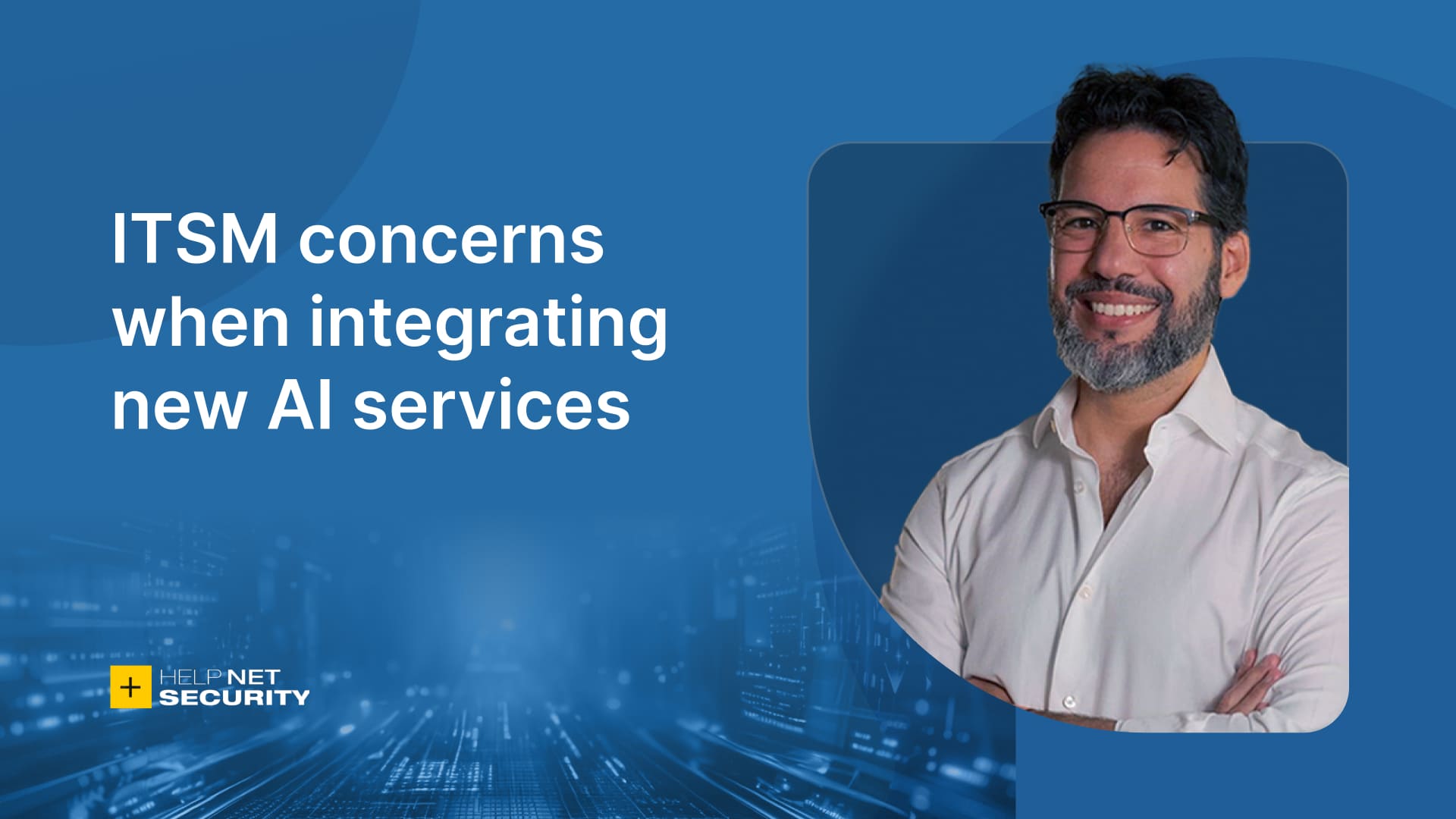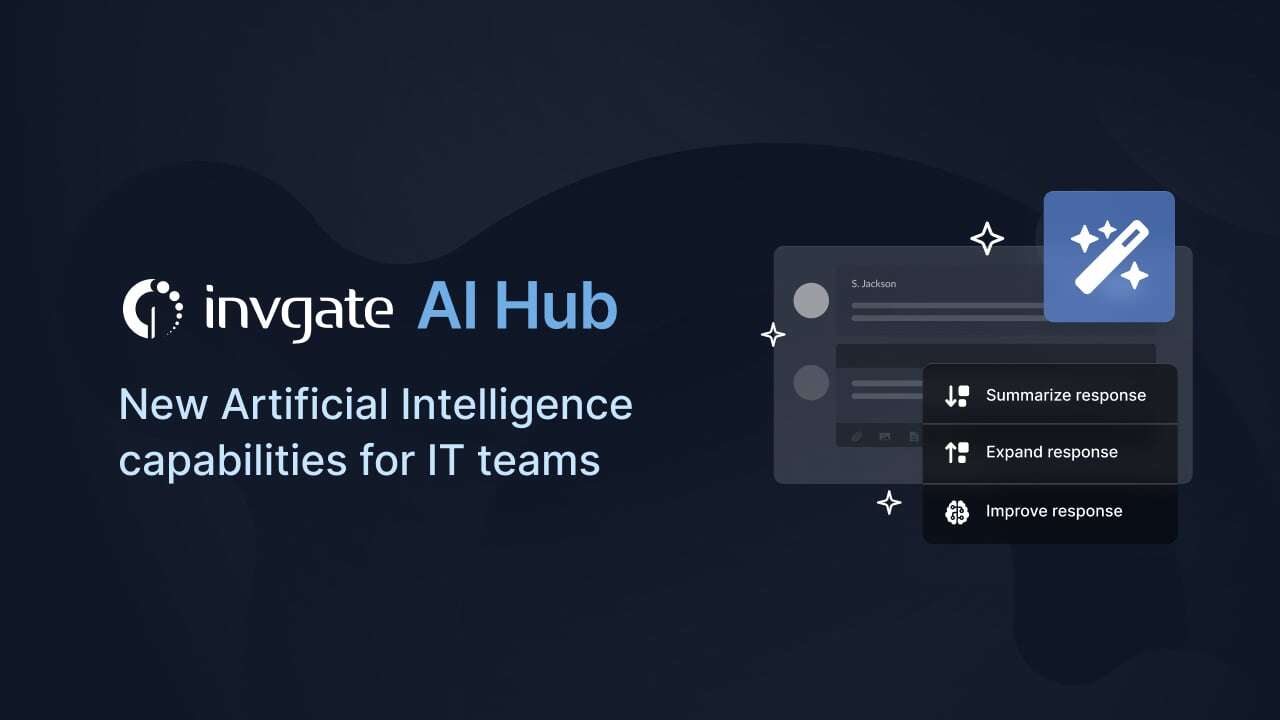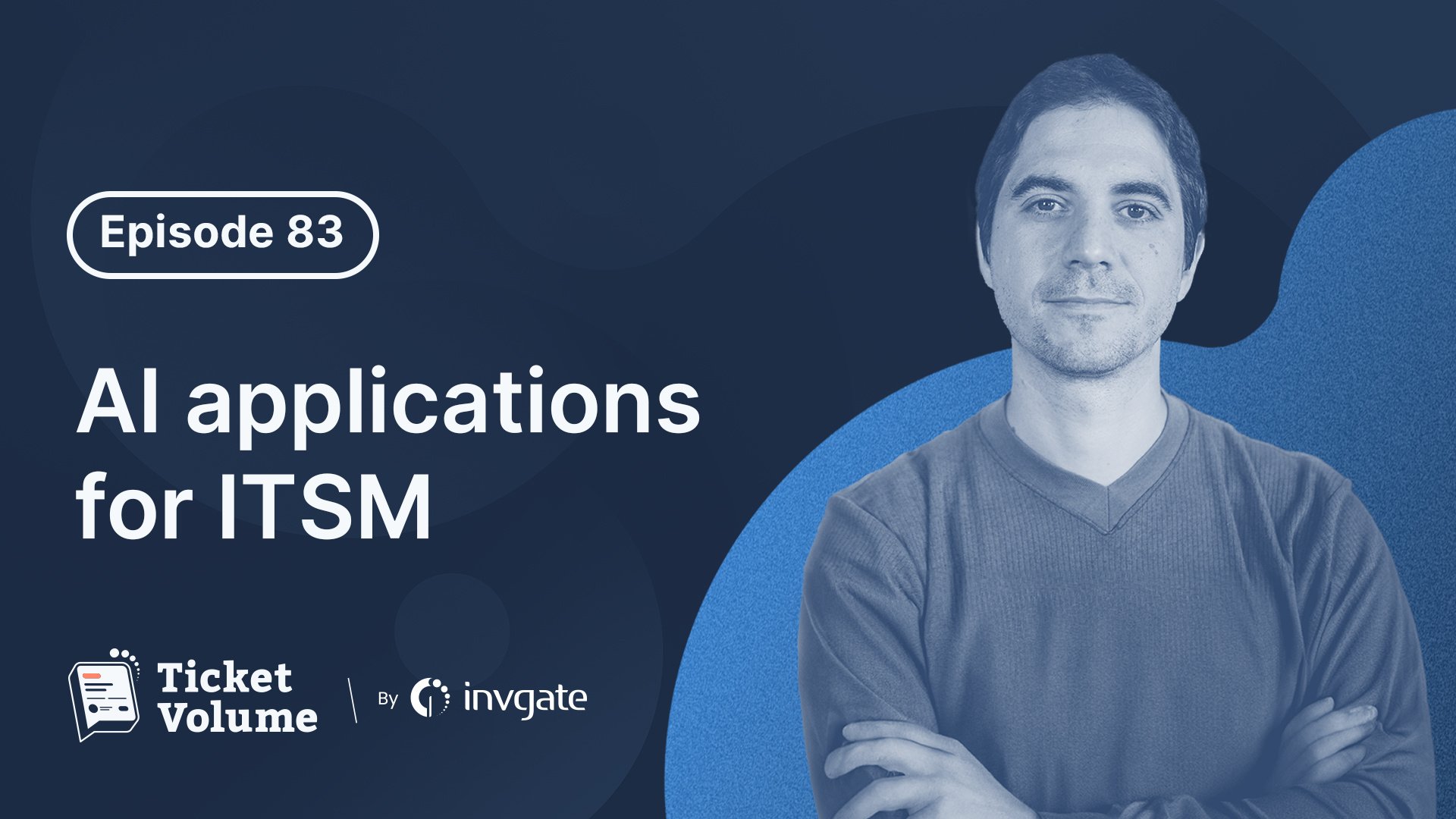On October 9, 2024, Gartner released its first-ever Magic Quadrant dedicated to AI applications in IT Service Management (ITSM). As artificial intelligence continues reshaping ITSM, Gartner's recent report takes a close look at how AI is impacting the tools and practices businesses use to deliver support.
Artificial intelligence is helping IT IT Service Management (ITSM) shift into a faster, more efficient process that’s set up to handle increasing demands. But picking the right AI-powered tool can be tricky.
In this article, we’ll explore the findings from Gartner’s inaugural Magic Quadrant report on AI in ITSM, examine how vendors measure up, and review the strengths and innovations driving today’s market. We'll also dive into InvGate’s latest AI-powered solutions, designed to simplify support and improve efficiency.
What is the 2024 Gartner Magic Quadrant for AI in ITSM?
The Gartner Magic Quadrant is a tool created by Gartner, a well-known research company, to help businesses understand how different technology companies compare.
Specifically for AI in ITSM, the Magic Quadrant highlights solutions that use AI to improve Service Management, whether through automating ticket handling, categorizing incidents intelligently, or guiding support teams to faster responses. Gartner’s goal with this report is to help IT leaders understand which vendors are strong choices for AI-driven ITSM solutions.
Importantly, AI in ITSM is still an emerging trend, which is why Gartner decided to evaluate it for the first time using the Magic Quadrant methodology. Meanwhile, the ITSM Magic Quadrant, which evaluates the industry as a whole, was replaced by the ITSM Market Guide in 2023 (and we're proud to be featured in it!).
How Gartner evaluates solutions
The Gartner Magic Quadrant is a research model that categorizes technology vendors into four groups—Leaders, Challengers, Visionaries, and Niche Players—based on two main criteria: their ability to execute and the completeness of their vision.
- Ability to execute: This aspect looks at several important factors, such as the quality of the product, how easily it integrates with other systems, and the support and training that vendors provide. Essentially, Gartner digs into everything from product performance to customer feedback, ensuring that the solution meets users' daily needs.
- Completeness of vision: Here, Gartner assesses how well a vendor understands the future direction of the industry. A vendor that scores high in this category typically has a clear plan for future features, invests significantly in research and development, and maintains a solid roadmap to keep their product relevant as needs change.
For every quadrant, Gartner's evaluation covers essential features like customer support automation, adaptability of the product, and ease of use. Additionally, they consider pricing models, the effectiveness of sales channels, and even the overall marketing and support ecosystem surrounding the vendor.
Overall, it's a well-rounded approach that gives a comprehensive view of both a vendor’s current strengths and their potential to keep pace with industry changes.

What did Gartner evaluate in AI ITSM tools?
For this study in particular, Gartner examined how effectively each tool can handle and enhance key ITSM tasks.
So, to be included in this Magic Quadrant, solutions had to support at least five of the nine standard capabilities Gartner identified as essential for AI-driven IT Service Management.
Here’s a closer look at the core features Gartner evaluated:
- Incident and Problem Management: To be useful, AI tools need to prioritize and escalate incidents intelligently. This means support teams can respond before service-level agreements (SLAs) are impacted, reducing time spent on issue resolution and preventing recurring problems.
- Knowledge discovery and management: AI tools often include knowledge discovery functions that surface relevant information fast. The best ones use large language models (LLMs) to generate knowledge base articles or summarize case information, freeing up time for service agents to focus on the task at hand.
- Anomaly detection and risk advisory: Advanced tools identify potential risks before they become major issues. By flagging high-impact incidents early, they help prevent disruptions and give IT teams a heads-up, making day-to-day support smoother.
- Generative AI for documentation: Many AI-powered tools now include generative features that automate content creation. Whether it’s generating support articles or summarizing cases, these tools streamline the documentation process and reduce manual effort.
These capabilities are designed to simplify ITSM workflows, making them faster and less prone to error. With Gartner’s focus on these features, businesses get a detailed view of which tools can offer tangible benefits for their Service Management needs.

The names in the AI for ITSM magic quadrant
The 2024 Magic Quadrant for AI applications in ITSM includes ten vendors:
- Aisera
- BMC
- Espressive
- Freshworks
- Halo Service Solutions
- Moveworks
- OpenText
- Serviceaide
- ServiceNow
- SymphonyAI
Each of these companies has a unique take on AI in ITSM. Some specialize in virtual support agents, while others focus on advanced incident detection and knowledge management.
Whether you’re in the market for a comprehensive AI solution or a specific feature to support an existing tool, the Magic Quadrant provides a great starting point for comparing your options.

Key insights from Gartner’s Evaluation
The Gartner Magic Quadrant report delivered several important observations and trends about AI’s role in ITSM today:
- Rise of virtual support agents: Virtual support agents, often powered by large language models (LLMs), are now commonplace in ITSM. These tools can provide end-users with answers to basic questions, route queries to the appropriate support team, and handle repetitive tasks, freeing up human agents to focus on more complex issues.
- Automated triage and categorization: Many vendors are implementing automated ticket triage and categorization. AI can help prioritize and categorize issues, helping support teams maintain service-level agreements (SLAs) and resolve incidents more efficiently.
- Generative AI in knowledge management: Generative AI is beginning to play a role in creating and updating knowledge base articles. AI is implemented in features that allow to draft responses, summarize incidents, and even create content that assists both users and support teams, contributing to more comprehensive knowledge resources with less manual effort.
- Predictive analytics and anomaly detection: Predictive analytics allow ITSM platforms to identify potential issues before they arise. Vendors are introducing anomaly detection features that identify patterns in data and alert IT teams to unusual activities, helping to prevent major incidents and improve overall service reliability.
Vendors are focusing on practical AI applications that streamline IT support, reduce operational costs, and improve the service experience for end-users.
However, Gartner also points out that a clear implementation strategy should accompany AI adoption. If organizations want to use AI for ITSM (IT Service Management), they need to be careful. Implementing new technology can sometimes lead to unexpected costs and disruptions in operations. So, it’s essential to have a solid strategy in place to avoid any bumps in the road.

InvGate AIHub: Innovative AI capabilities for ITSM
While InvGate may not be included in Gartner’s 2024 Magic Quadrant, the InvGate AIHub brings a powerful set of AI-driven features that enhance ITSM processes and elevate service quality.
InvGate AIHub is specifically designed to optimize the IT support experience, focusing on automation, knowledge management, and predictive insights that simplify daily operations.
AI-enhanced responses for faster support
InvGate AIHub allows support teams to respond to tickets faster by analyzing historical cases and frequently asked questions to generate relevant suggestions.
Routine tickets can be addressed more quickly, allowing agents to focus on complex issues that require human insight.
Ticket summarization for seamless handoffs
When a ticket changes hands, AIHub provides a clear summary of the ticket’s history and relevant details. Agents who take over a case get a concise overview immediately, which improves continuity and accelerates the resolution process by eliminating the need to sift through previous interactions.
Virtual Agent with enhanced self-service
With AIHub’s virtual Agent, users can access knowledge base articles and self-service options through a conversational interface. This reduces the volume of incoming tickets and empowers users to resolve common issues independently, all without requiring a support agent to intervene.
Automated knowledge article creation
To further support knowledge management, AIHub automates the process of drafting knowledge base articles from resolved tickets. This feature enables IT teams to maintain up-to-date resources effortlessly, giving both users and support staff access to relevant information without a continuous need for manual updates.

AI in ITSM: What organizations should consider
For organizations looking into AI-driven ITSM solutions, we've gathered some key factors to evaluate before committing to a tool or platform:
1. Does the solution fit your needs?
Each AI-driven ITSM solution comes with unique capabilities and focus areas, so organizations you should choose vendors whose offerings align closely with your specific business needs.
This may involve assessing how well the AI solution integrates with existing systems, supports specific workflows, or addresses particular pain points within the organization’s IT support processes. For example, if incident management is a primary concern, choosing a platform with robust predictive analytics and automated triage features may be beneficial.
2. Can the tool grow with your business?
AI tools need to adapt as your organization grows. Look for solutions that are both scalable and flexible, with the ability to support additional demand without major reconfigurations.
Scalability is particularly important for businesses experiencing rapid growth or high variability in support demand, as it ensures that the tool can manage additional users, data, and incidents over time.
3. Total cost of ownership
Beyond initial licensing fees, implementing AI may involve training, maintenance, and integration expenses.
Conduct a cost-benefit analysis to determine if the expected ROI justifies the investment, particularly for advanced AI features that require specialized setup or customization.
4. Security and compliance considerations
Since AI tools handle sensitive data, organizations should prioritize vendors demonstrating strong data protection measures and adherence to industry regulations.
This is particularly true if your business must comply with rigid standards like GDPR or HIPAA. Evaluating the security framework around the AI solution can help mitigate risks associated with data breaches or misuse.

Conclusion
AI in ITSM is transforming how organizations manage their support processes, and Gartner’s Magic Quadrant provides a practical way to compare solutions.
However, understanding the tool’s potential is only one side of the equation. Each solution has unique capabilities and considerations, so finding the right one depends on your organization’s specific needs, budget, and long-term strategy.
The insights from Gartner’s Magic Quadrant emphasize not only the value of practical AI applications but also the importance of planning for adoption. A well-matched AI tool can drive efficiency, reduce costs, and support growth.
Frequently Asked Questions
What factors does Gartner evaluate for AI in ITSM?
Gartner assesses vendors based on two main criteria: Ability to Execute and Completeness of Vision. For AI in ITSM, this includes evaluating features like incident management, automated triage, knowledge management, virtual support agents, and anomaly detection. Additionally, Gartner considers ease of integration, user experience, vendor support, and future roadmap.
What trends in AI for ITSM does Gartner highlight?
Gartner’s report points out several key trends in AI for ITSM, including the rise of virtual support agents, automated ticket triage, generative AI in knowledge management, and predictive analytics for proactive issue management. These trends reflect a broader focus on efficiency, cost reduction, and improved end-user experience in ITSM.
How should organizations use the Magic Quadrant to choose an ITSM solution?
Organizations should use the Magic Quadrant to identify vendors that align with their specific needs and ITSM objectives. It’s essential to consider factors like scalability, total cost of ownership, integration capabilities, and the support requirements of each solution. Additionally, looking at each vendor’s placement in the quadrant can provide insights into their market strength and innovation level.
















